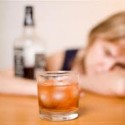Boozy Betty: a warning of the effects of alcohol
A Prevailing image of students has tended to be that of the hard-drinking kind. Boozy Betty is no different. She’s out drinking with friends into the wee hours, she can’t remember how she got home and her grades are beginning to suffer as a result.
Boozy Betty is a poster girl to remind Heriot-Watt students in Edinburgh of the dangers of drinking too much. The campaign has been so successful the National Union of Students in Scotland has formally endorsed it to be promoted throughout the country.
The campaign was launched by Action on Alcohol and Drugs in Edinburgh in November, who distributed posters and cards, as well as training student wardens and welfare staff on alcohol issues. A regular on campus advice service point was also set up for students.
Female students were asked how they felt about the campaign, which lists a typical week for Boozy Betty, including, “missed lectures, having her bank card refused, going into town for some serious partying, developing a muffin top and looking rough”.
Christine Johnstone, director of student welfare at the university, said it wanted to be proactive and was not reacting to a particular problem on campus. However, researchers found 36% of female students drank eight to 16 units on both Friday and Saturday nights – four to five times the recommended amount.
The majority of students surveyed said the campaign had made them reflect on their drinking habits and more than a third said they had felt embarrassed about their drinking. The evaluation report also found 10% said the resources would prompt them to reduce their alcohol use, mainly because of the impact on their studies and falling behind.
Almost all respondents said they had missed lectures after a night out, but just 7% said they had changed their behaviour, citing peer pressure and lack of confidence as the main reason for why changing was too difficult.
First year student Gillian Stewart, 19, said the campaign had made her think about how much she was drinking and admitted she was surprised by how many calories were in alcohol.
“The whole campaign came from a different angle than most others because it focused on what would happen to us now, like missing deadlines and getting muffin tops, (spare tyres) rather than what will happen years down the line. It’s made me more conscious of what I’m drinking and in my circle of friends, we’re more careful of what we’re doing.”
Liam Burns, depute president (elect) of NUS Scotland, and president of Heriot-Watt University Students’ Association said: “NUS Scotland voted last month to formally endorse the promotion of Boozy Betty and promote the campaign in colleges and universities across Scotland in recognition of its success. It has also had considerable interest from across the UK, with similar mandates being passed during NUS UK annual conference.”
Tom Wood, chairman of Action on Alcohol and Drugs in Edinburgh said: “There’s a tendency for people to dismiss excessive student drinking as simply a phase and something that students do’. However, the evidence clearly shows that alcohol-related illnesses and deaths among young women are growing, and we are seeing a growing trend of problematic drinking among this group.
” The evaluation clearly shows Boozy Betty has made many of the women start to question their drinking and in some cases even prompt a reduction in their drinking – this is immensely encouraging.”
Heriot-Watt University plans to continue the Boozy Betty campaign and will launch a similar project targeting male students in the next academic year.
source: Sunday Herald

